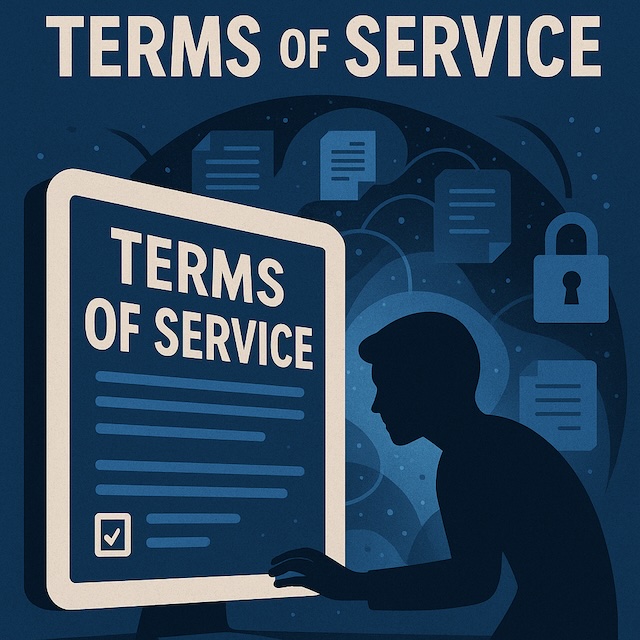We earn commissions when you shop through the links below.
Online Terms of Service (ToS) function as adhesion contracts, and their enforceability depends less on substantive negotiation than on how courts interpret contract formation, assent, and unconscionability doctrines. This post examines doctrinal lessons from U.S. jurisprudence on drafting enforceable online agreements.

1. Clarity of Assent
Lesson: Courts require clear manifestation of assent, particularly in digital interfaces.
- Specht v. Netscape Commc’ns Corp., 306 F.3d 17 (2d Cir. 2002) — refusal to enforce terms hidden below a “Download” button underscores the necessity of conspicuous notice.
- Meyer v. Uber Techs., Inc., 868 F.3d 66 (2d Cir. 2017) — enforcement of Uber’s sign-in-wrap illustrates that minimal but clear notice (a hyperlink adjacent to a “Register” button) can suffice.
Doctrinal Principle: Drafting must ensure terms are reasonably conspicuous and that assent is tied to a definitive user action.
2. Reasonableness of Forum Selection and Choice of Law
Lesson: Courts enforce forum selection and choice of law provisions when reasonably related to the transaction and not unduly burdensome.
- Carnival Cruise Lines, Inc. v. Shute, 499 U.S. 585 (1991) — upheld forum selection despite adhesive format, provided the clause was fundamentally fair.
- However, some courts scrutinize provisions requiring consumers to litigate in remote or burdensome jurisdictions.
Doctrinal Principle: Reasonableness governs. Clauses must balance predictability for businesses with fairness to consumers.
3. Limits on Unilateral Modification
Lesson: Unilateral modification clauses risk unenforceability absent notice and assent.
- Douglas v. Talk America, Inc., 495 F.3d 1062 (9th Cir. 2007) — users were not bound by terms unilaterally posted without notice.
Doctrinal Principle: Modifications must be accompanied by reasonable notice and opportunity for assent; otherwise, they may be deemed illusory.
4. Arbitration Clauses and Class Action Waivers
Lesson: Courts strongly favor arbitration under the FAA but scrutinize fairness.
- AT&T Mobility LLC v. Concepcion, 563 U.S. 333 (2011) — FAA preempts state laws invalidating class action waivers.
- Armendariz v. Foundation Health Psychcare Servs., Inc., 24 Cal. 4th 83 (2000) — requires arbitration provisions to provide adequate remedies and mutual obligations.
Doctrinal Principle: Arbitration is enforceable, but provisions must not eliminate substantive rights or remedies.
5. Limits of Liability and Exculpatory Clauses
Lesson: Liability caps are enforceable if reasonable, but cannot disclaim liability for intentional torts or statutory violations.
- Henningsen v. Bloomfield Motors, Inc., 32 N.J. 358 (1960) — invalidated a warranty disclaimer that deprived consumers of meaningful remedies.
Doctrinal Principle: Drafting must avoid provisions that contravene public policy or strip essential statutory rights.
6. Incorporation of Privacy Policies
Lesson: Courts generally reject privacy policies as standalone contracts but may enforce them when incorporated by reference into ToS.
- In re JetBlue Airways Corp. Privacy Litig., 379 F. Supp. 2d 299 (E.D.N.Y. 2005) — refused to enforce a privacy policy not incorporated into any binding agreement.
Doctrinal Principle: To be binding, ancillary documents (privacy policies, community guidelines) must be explicitly incorporated into the ToS.
7. Unconscionability as a Safety Valve
Lesson: Courts use unconscionability to police substantive overreach in adhesion contracts.
- Williams v. Walker-Thomas Furniture Co., 350 F.2d 445 (D.C. Cir. 1965) — foundational articulation of unconscionability.
- Armendariz (above) — applied the doctrine to invalidate one-sided arbitration.
Doctrinal Principle: Even with assent, provisions that are overly harsh or one-sided remain vulnerable under unconscionability doctrine.
Key Takeaways
- Interface design and assent mechanisms are as important as contract text.
- Reasonableness and fairness are guiding doctrines for forum selection, liability limits, and arbitration provisions.
- Notice and assent remain essential for enforceability of modifications and ancillary policies.
- Unconscionability and public policy operate as the doctrinal checks on corporate overreach.
In the final post of this series, we’ll turn to The Future of Digital Contracts, analyzing how emerging technologies like blockchain and AI fit within existing U.S. contract doctrines.





